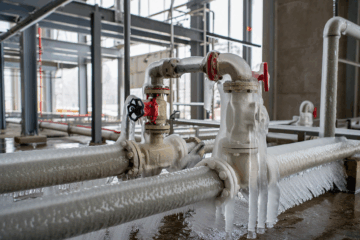My ex-husband and I ran a high-end landscaping firm that worked with many property management companies. In the summer, it was fairly straightforward, and we did not have many property emergencies. However, in the winter, we had many snow emergencies that interrupted their clients’ business operations. So, our job was to remove the snow as quickly as possible as well as salt the lots and sidewalks for safety and legal reasons.
Here are some more common causes of business interruption:
- Fire and explosion
- Water damage
- Cyber incidents
- Supplier failure
- Natural disasters
- IT outages and power failures
- Machine and equipment failure
Depending on the severity of the damage, a business could be looking at days, weeks, or even months of repair, recovery, and restoration.
Worst-case scenario – a business could shut down as a result, and it is not far-fetched to imagine that one in four or 25% of businesses affected by a fire do not reopen after an incident. If this happens, employees will also lose their jobs, and the community might miss a crucial service your business provides.
According to the Small Business Administration (SBA), a business should apply the following steps to stay prepared, “Disasters can take many forms and the financial cost of rebuilding after a disaster can be overwhelming. If you’re prepared for emergencies, you’ll be in a better position to recover and continue operations should disaster strike.
Be prepared
Step 1: Assess your risk
Step 2: Create a plan
Step 3: Execute your plan
Get financial assistance after a disaster
Make your business resilient
Mitigation assistance,”.
Let’s see what else we might need to do should a fire happen.
What happens when a business catches fire?
There are several reasons why a commercial building might catch fire, such as cooking-related equipment, electrical or lighting, and blazes in the manufacturing, oil and, gas in retail sectors.
Although it does not matter what caused the fire, it is what happens afterward. Should the unfortunate event happen, below are some vital ways to address the disaster.
Business interruption insurance is meant to protect you during a natural or man-made disaster, but determining the impact and extent of the interruption can be subjective. Licensed public adjusters focus on managing your claim and calculating the income lost from the damage to negotiate a fair and just settlement.
If a fire happens during business hours, the first concern is obviously the safety of employees and clients. Sadly, there’s a risk of injuries or even fatalities, a confronting reality that underscores the importance of adequate safety measures and response planning as it not only affects your business on a deeply personal level but can also lead to significant financial liabilities.
Should the fire break out when the business is closed, you might find yourself facing only material losses—damages to property, equipment, inventory, or other assets. Although it seems like a silver lining, these losses can still impose a hefty financial burden and emotional strain, both of which are non-negligible.
A fire can grind your operations to a halt, with the length of this interruption depending on the extent of the damage and the speed at which repairs are completed. During this challenging period, maintaining open lines of communication with your customers or clients is crucial. It’s all about managing expectations—informing them upfront about potential delays in service or changes in delivery timelines. Being proactive can significantly influence their loyalty, giving them a reason to stick with your business rather than seeking alternatives.
And amidst all the turmoil comes a critical step: filing for insurance claims. Hopefully, your commercial property insurance covers fire damage, helping to offset the financial blow you’ve just sustained. Be sure to comb through your policy, as exclusions like arson or other specifics might apply. If your coverage is adequate, it can significantly aid in rebuilding and recovering from this setback. If not, and you find yourself without insurance, be ready to shoulder the cost of repairs out-of-pocket, which can be a daunting task given the likely financial strains.
Lastly, the restoration process should assess the damage and start clearing out what the fire has rendered unusable. Whether it’s damaged appliances or essential equipment, replacements are inevitable. This phase is critical to getting your operations back on track, which in itself is a form of healing—both for your business and for you as an entrepreneur. It’s about rebuilding, not just the physical structures or assets but the hope and drive that push your business towards recovery.
There’s also the matter of cleaning up soot and smoke damage. You’ll need to treat areas with soot, especially soot on any metal and electrical wiring, to avoid further damage to them. Then, you need to check for possible water damage caused by sprinklers or firefighters. If left unchecked, this could lead to mold.
Another item on your to-do list should be to look for possible chemical damage. Depending on your business, you could be dealing with toxic odors or degraded surfaces. In these cases, it’s best to call a company that specializes in removing or cleaning up chemical damages caused by fire to ensure everything’s taken care of properly.
Last but not least, check your wirings for water, soot, or smoke damage. Again, call for a professional to do this for you.
What triggers business interruption insurance?
Business interruption coverage typically can only be triggered if you have direct physical property loss that leads to the business interruption – for example, a fire or flood damaging the property that has caused you to suspend your business activities.
According to the government Texas Department of Insurance (TDI), “Business interruption insurance generally covers financial losses that occur when a company can no longer do business due to direct physical loss of or damage to its property by a peril covered by the policy.
A related product is contingency business interruption insurance, which covers indirect losses when suppliers or customers are affected.
Some business interruption policies extend coverage for “civil authority” orders that restrict access to property because of damage to nearby property by a peril covered under the policy.
Some business interruption policies extend “extra expense” coverage for necessary expenses that would not have incurred if there had not been direct physical loss or damage to the property by a peril covered under the policy.
Some policies exclude viruses, epidemics, and pandemics,”.
Most common cause of business interruption
In conclusion, business interruptions arise from various scenarios, including fires, natural disasters, and cyber incidents. Preparedness through risk assessment and effective planning, alongside appropriate insurance coverage, can mitigate impacts and ensure business resilience.



0 Comments